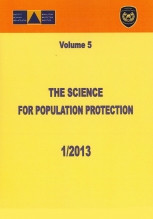IMPROVISED PROTECTION BY CONCEALMENT II. PROPERTIES OF WOODEN WINDOWS
DOI:
https://doi.org/10.71934/Keywords:
Air leakage, improvised protection by concealment, marking gas sulphur hexafluoride, wooden windowAbstract
A measurement of tightness of a wooden window, sealed with duct tape
and a polyethylen sheet, was performed. The following three assessment methods
were used: pressure drop rate measuring, air permeability measuring, and measuring
a decreased rate of sulphur hexafluoride concentration in the test chamber.
From the measured results were calculated permeability related to the
length of the gap and the window area; and its effect on the sealing method was
discussed. The results were compared to the values measured at the penetration of
sulphur hexafluoride.
Measurement of the penetration of sulphur hexafluoride was performed at
different pressures (wind speeds), and effect of each way sealing and input
concentration were compared.
Downloads
Published
Issue
Section
License
Copyright (c) 2025 The Science For Population Protection

This work is licensed under a Creative Commons Attribution-NonCommercial-NoDerivatives 4.0 International License.
Published under license


